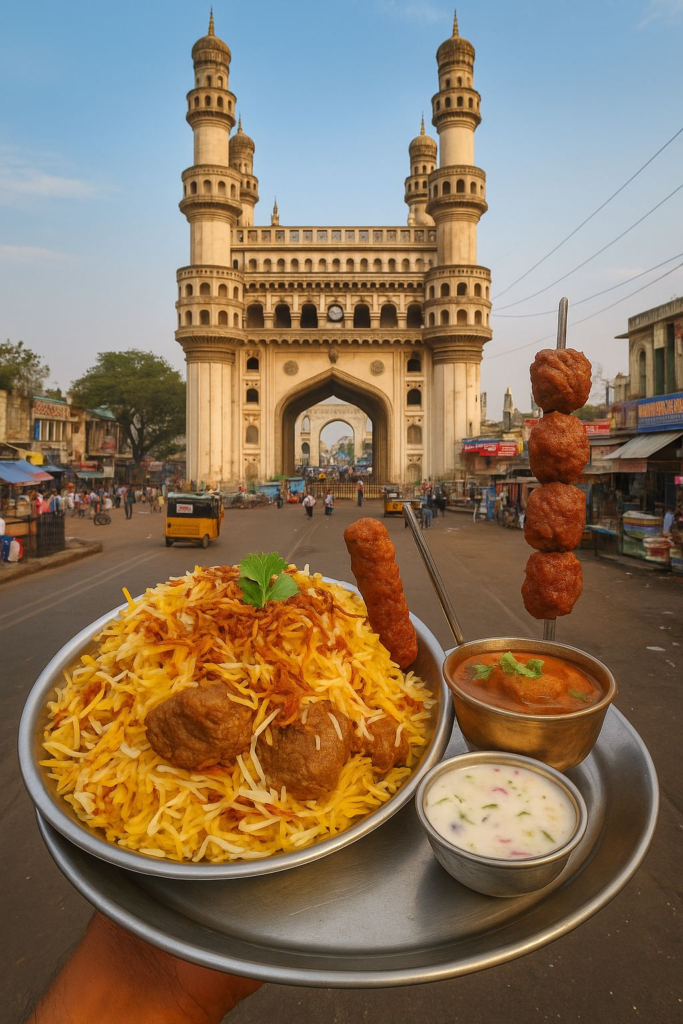
“You are what you eat” — a saying we often hear — holds deep meaning for many. This wise proverb, interestingly, has its roots in France. In 1825, the renowned French gastronome Jean Anthelme Brillat-Savarin coined the phrase in The Physiology of Taste: “Dis-moi ce que tu manges, je te dirai ce que tu es,” meaning “Tell me what you eat and I will tell you who you are.” While this may sound like a historical nugget, it’s a powerful reminder of the connection between our food choices and who we are.
Though this idea began in the West, its truth resonates deeply in India — especially in Hyderabad, the historic home of the Nizams. Here, food is not just sustenance; it is a language, a legacy, a living story passed from one generation to the next. From bustling bazaars to aromatic kitchens and lavish dastarkhwans, Hyderabad’s cuisine is a vibrant chapter of cultural storytelling.
Hyderabad’s Culinary Soul
To truly experience the city, one must dive into its cuisine — a rich blend of Mughal opulence and Telugu zest. Savoring Hyderabadi food feels like stepping into the past, with every dish evoking images of grand durbars and lyrical mehfils.
Imagine the royal kitchens of the Asaf Jahi dynasty, where Nizams ruled for over two centuries. These weren’t mere cooking spaces — they were culinary laboratories. The Khansamas, or royal chefs, were artists in their own right, crafting masterpieces from exotic spices and fresh Deccan produce. Their creations were not just meals; they were edible poetry. It is in these kitchens that the legendary Hyderabadi Biryani was born.

The Epic of Biryani and the Heart of Haleem
More than just a dish, Hyderabadi Biryani is a cultural icon. Cooked using the traditional Kacchi Yakhni method — where marinated meat is layered with semi-cooked rice and slow-cooked in a sealed clay pot — the biryani is a symphony of flavors. Each spice carries its own story: the warmth of cloves, the royal aroma of saffron, and the richness of cardamom all speak of distant trade routes and cultural exchanges. The tender meat whispers tales of pastoral roots, while long-grained Basmati connects to the lush northern plains.
But Hyderabad’s culinary tale doesn’t end with biryani. Come Ramzan, the city transforms into a vibrant food festival where Haleem becomes the star. Originating in Arabia, Haleem made its way to Hyderabad with the Chaush community — Yemeni soldiers in the Nizam’s army. What began as a simple wheat-and-meat porridge evolved into something extraordinary in the hands of Hyderabadi chefs.
They added ghee, spices, and an elaborate slow-cooking method, turning the dish into a creamy, rich paste cooked lovingly in a large bhatti. Stirred for hours, haleem becomes a shared dish of unity, savored by people across faiths. It tells a powerful story of migration, adaptation, and the city’s warm embrace of new influences.
Quiet Chapters and Sweet Endings
Hyderabadi cuisine also includes humble yet memorable bites like Lukhmi, a square-shaped, meat-filled pastry that makes for a perfect starter. Then there’s the beloved Irani Chai, a sweet, milky tea whose roots trace back to Persian immigrants. The iconic Irani cafés — with their checkered tablecloths and clinking cups — are more than eateries; they are cultural landmarks where stories are exchanged as freely as the chai.
No Hyderabadi meal is complete without dessert. Qubani ka Meetha, a rich apricot dessert, speaks of Hyderabad’s trade links with Central Asia. Meanwhile, Double ka Meetha, a bread pudding soaked in cardamom- and saffron-infused milk, is a lesson in transforming humble ingredients into a royal indulgence.
The True Taste of Tradition
Indulging in Hyderabadi food isn’t just about taste — it’s about cultural immersion. Each dish, from biryani to haleem to chai, carries a history, a memory, and a message. These recipes are not mere instructions passed down over generations — they are heirlooms preserved in the hearts of the people. To eat in Hyderabad is to taste its stories, and to understand the soul of a city that continues to celebrate its rich, flavorful past.
(The author, Ramanujan Ankam, is the Founder of Food Lanes.)




